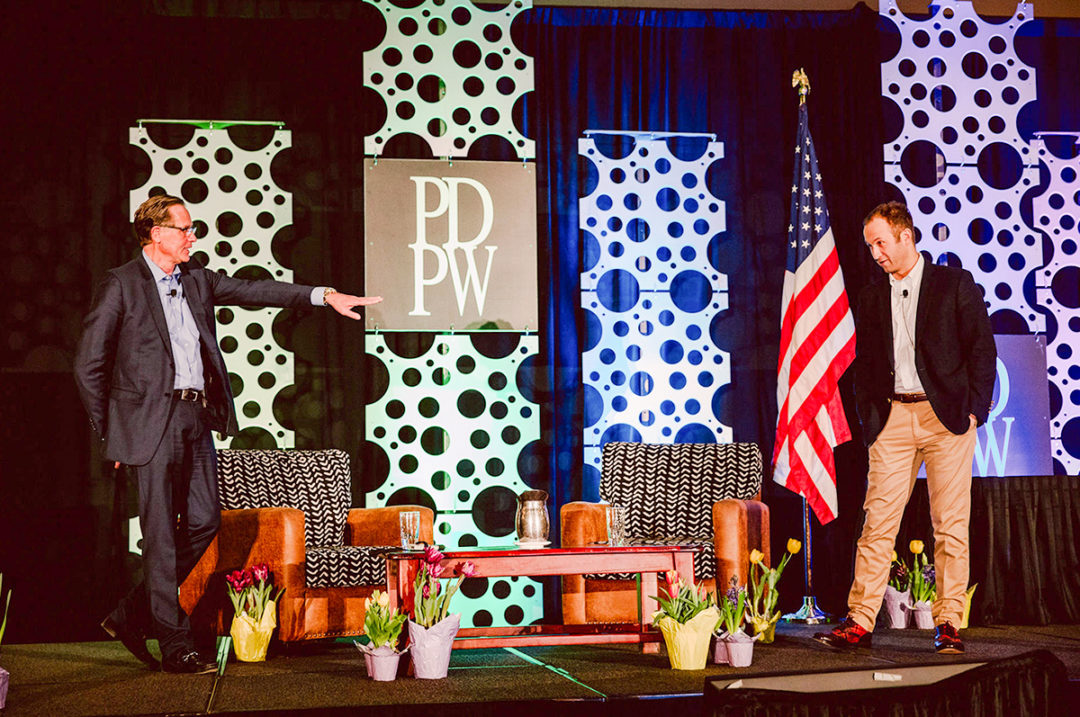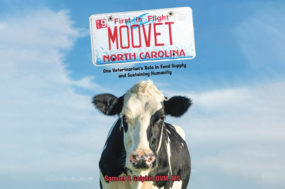The 2023 Professional Dairy Producers (PDPW) Business Conference was held March 15-16 in Wisconsin Dells, Wisconsin. The annual conference brought together nearly 1,400 dairy producers and industry professionals for professional development and networking.
“Empowering Success” was the theme of the annual conference, which featured nearly 60 speakers during two days of learning, interactive sessions and networking opportunities. Speakers and facilitators challenged dairy farmers and industry professionals to not only expand their knowledge and skills for their own operations and businesses, but also to watch for opportunities to strengthen their communities and the dairy industry. Sessions at the 2023 Business Conference were simultaneously translated into Spanish.
Geopolitical, global impacts
One key to future dairy success will be to understand changing geopolitical and global economics, according to two conference keynote speakers.
Jacob Shapiro, partner and director of Cognitive Investments, provided an overview of geopolitical changes in the U.S. and around the world. In the political spectrum, both sides believe they are correct, he noted. “You have to be able to switch back and forth between different sets of ideas and different points of view,” he said.
Current changes include a switch from a lengthy “bipolarity” environment in which the U.S. and Russia were the global political and military powers to a “multipolarity” environment, in which political, financial and military powers are regionally diverse and volatile.
While regionalism is leading to “deglobalization” when it comes to economics and trade, countries and industries – including dairy – must recognize changing spheres of influence to get more economic integration.
“Obviously exports are critical to the economic viability of U.S. dairy farmers,” Shapiro said. “Something like one-sixth of all U.S. milk is sold commercially around the world. I want you to have in mind that there are opportunities at the regional level, to shift away from thinking ‘I'm just going sell to a billion Chinese people’ and instead think more about the markets [we’re] going to have good relationships with, where our politics is going to be conducive to selling products.”
Dan Basse, president of AgResource Co., echoed Shapiro’s theme, discussing a “great reset” underway for the dairy economy, which will spell a more competitive world market.
Short-term, with the outlook for weaker dairy prices ahead, Basse urged PDPW members to capitalize on high prices for dairy beef while maintaining lids on milk production increases.
“This is probably the best chance for Wisconsin and U.S. dairy to see (milk) production decline, as more of you are more aggressive ‘coloring’ your herds,” he said.
Brewer: Strategic planning
In two sessions, Brady Brewer, associate professor in the department of agricultural economics at Purdue University, discussed evolving financial and technological factors and their impact on how dairy producers arrive at strategic-planning decisions. He noted that there is no single strategy to guarantee dairy profitability.
Brewer said farm owners and managers have the option to utilize “five strategic levers” that will impact profitability: output price, yield, costs, assets and people. “In general, any decision you make on your business or your dairy is going to fall under one of these five categories,” he said. “While (the list is) grossly oversimplified, think about what options you have to make your business more profitable.”
Not all are equally manageable, Brewer warned. “Different people focus on different things,” he explained. “You can yield your way to prosperity; you can save your way to prosperity. The outcome depends on your management style.”
While the first four “levers” are part of a farm income statement, managing the “people” lever frequently impacts all others, he said.
When developing strategies, Brewer urged producers to start with personal goals and then design business goals to achieve those personal goals. Explore the external and internal environments impacting those business goals.
“There is no one correct strategy; do what works for you. Be very deliberate in the actions you take with the five levers.”
Three economic principles
After reviewing the current state of the economy with the March bank closures, bonds and stocks both falling in 2022, and the consumer price index at 6% in February (about 0.5% lower than previous months), Dr. Ed Seifried reported there was not a recession in the first quarter of 2023, but there remained a 60% chance a recession could occur.
As professor emeritus of economics and business at Lafayette College, Seifried took the opportunity to teach on three economic principles that tend to be ignored.
The first is to expect change. “Change is constant in our lives,” he said.
The next principle is opportunity cost. “Opportunity cost is the only way to judge what it costs you to do anything,” Seifried said. “It is what you give up to get.”
The third principle is sunk cost. This is money that is already spent and cannot be retrieved. “It’s not a cost at all. It is history,” he said, noting that confusing sunk costs with rolling costs can lead to very costly mistakes.
For example, he shared the story of a bank CEO that invested $6 million to build a new branch in a location that no one goes to because it is against traffic flow and hard to get to. Even though the branch loses money in operating costs every month, he won’t close it because of the value of the original investment.
Seifried asked the audience if they have something on their dairy that they invested in decades ago, years ago or recently that is not working any more, but is kept because of the initial investment. If so, it is a violation of sunk cost.
“I can't think of another mistake that you would make as an ag producer that would cost you more money than sunk cost,” he said.
Make an impact
To close out the conference, Dr. Rick Rigsby, former Texas A&M University professor, football character coach and award-winning journalist, outlined what it means to make an impact, not just an impression.
“We live in a culture where we would rather look good than be good,” Rigsby said. In encouraging leadership growth, his aim was to help attendees make their communities stronger. “When that happens, you’re making the entire dairy industry stronger,” he added.
It starts with being the kind of professional dairy person that your grandmother would hire. Rigsby said grandparents had common sense in spades, they were dependable, they told the truth, they talked the best of people and protected the integrity of doing business the right way.
Three things that can be learned from Grandma and Grandpa that can be taken back to the farm are: practice the basics, own it, and have a growth mindset.
“If you don’t practice basics, you will never be great,” Rigsby said. “When you execute the basics better than anybody else, you grow your capacity for that which you want.”
By owning it, you don’t complain, blame others or make excuses; you figure out a way to get it done.
A growth mindset imagines what could be and doesn’t worry about what you have or don’t have. “Start where you are, use what you got, do what you can,” he said.
Hands-On Hub
A popular component of the annual conference are “Hands-On Hub” sessions, offering dairy producers to test technologies on-site. This year’s sessions included were led by: Katie Raver, animal nutrition and field support specialist, Rock River Laboratory, who demonstrated new technologies for monitoring, measuring and tracking feed rations; and University of Wisconsin – Madison School of Veterinary Medicine assistant professors Ryan Breuer and Paul Merkatoris, who provided hands-on, practical insights for managing close-up and maternity care.
Nexus Stage
Progressive Dairy’s Walt Cooley moderated the Nexus Stage, previewing new technologies and innovations. Presentations and technologies highlighted included: Arm & Hammer, presenting Certillus; Glori Enterprises, presenting The Fodd; Nedap, presenting SmartFlow; smaXtec, presenting TruDrinking; and Zinpro, presenting IsoFerm.
Youth programming
Michael Hoffman, who served as PDPW Business Conference emcee, facilitated special Youth Leadership sessions for youth aged 15-18. Author, speaker and founder of Dallas-based Igniting Performance, he provided insights on making first impressions and illustrating the importance of people-to-people interactions.
Board elections
Newly elected to the PDPW board were Wisconsin dairy producers Patty Dolph, Dolph Dairy LLC; JJ Pagel, Pagels Ponderosa Dairy LLC; and Laura Raatz, Wagner Farms. They join returning board members: Janet Clark, Vision Aire Farms LLC; Paul Lippert, Grass Ridge Farm; Brady Weiland, Weiland Dairy LLC; Ken Feltz, Feltz Family Farms Inc.; John Haag, Haag Dairy LLC; and Corey Hodorff, Second-Look Holsteins LLC. Serving as PDPW board advisers to the 2023-24 board are Eric Birschbach of Ag Site Crop Consulting LLC, Curtis Gerrits of Compeer Financial, Josh Mullins of Mullins Cheese and Roger Olson of Zinpro Corporation.
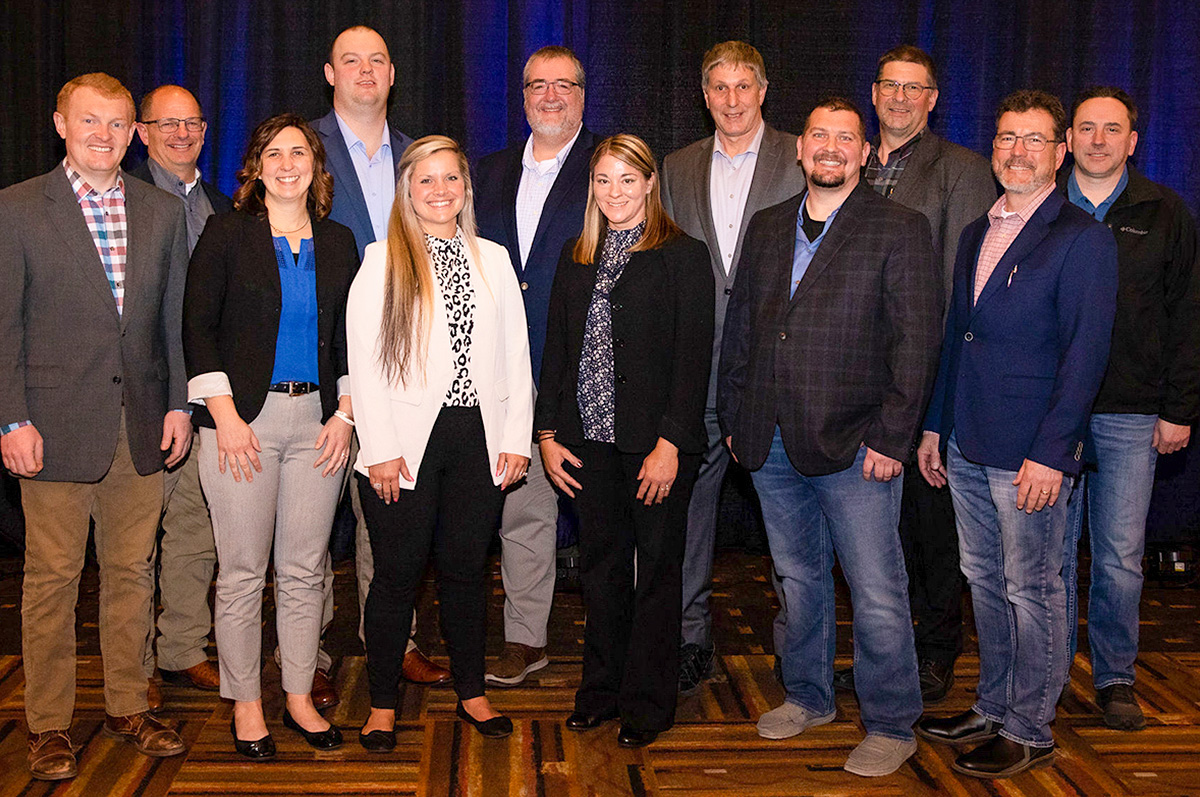
The 2023-24 Professional Dairy Producers (PDPW) board of directors includes (left to right, front row): Paul Lippert, Janet Clark, Laura Raatz, Patty Dolph, JJ Pagel, and Eric Birschbach (adviser); and (back row, left to right) Roger Olson (adviser), Brady Weiland, Corey Hodorff, John Haag, Ken Feltz, and Josh Mullins (adviser). Photo courtesy of Professional Dairy Producers (PDPW)
Diederichs honored
Mark Diederichs was honored as the third recipient of the PDPW’s Dean Strauss Leadership Award. Diederichs served as manager of Lake Breeze Dairy – one of the three dairies that comprise Breeze Dairy Group – until his retirement in 2019. Diederichs was a member of the PDPW board from 2008-14, serving as president from 2012-14. He also served as a board member and board chair r the Professional Dairy Producers Foundation (PDPF) and continues to help raise funds to support dairy-centric educational programs. Active in his church and community, he assisted in creating the Holyland Food Pantry, is a former volunteer fireman, a member of St. Peter’s Lions Club and is involved in the Fond du Lac Alzheimer’s Walk. The Dean Strauss Leadership Award was established in 2021 in honor of Dean Strauss, a Wisconsin dairy farmer and industry leader who passed away in 2019.
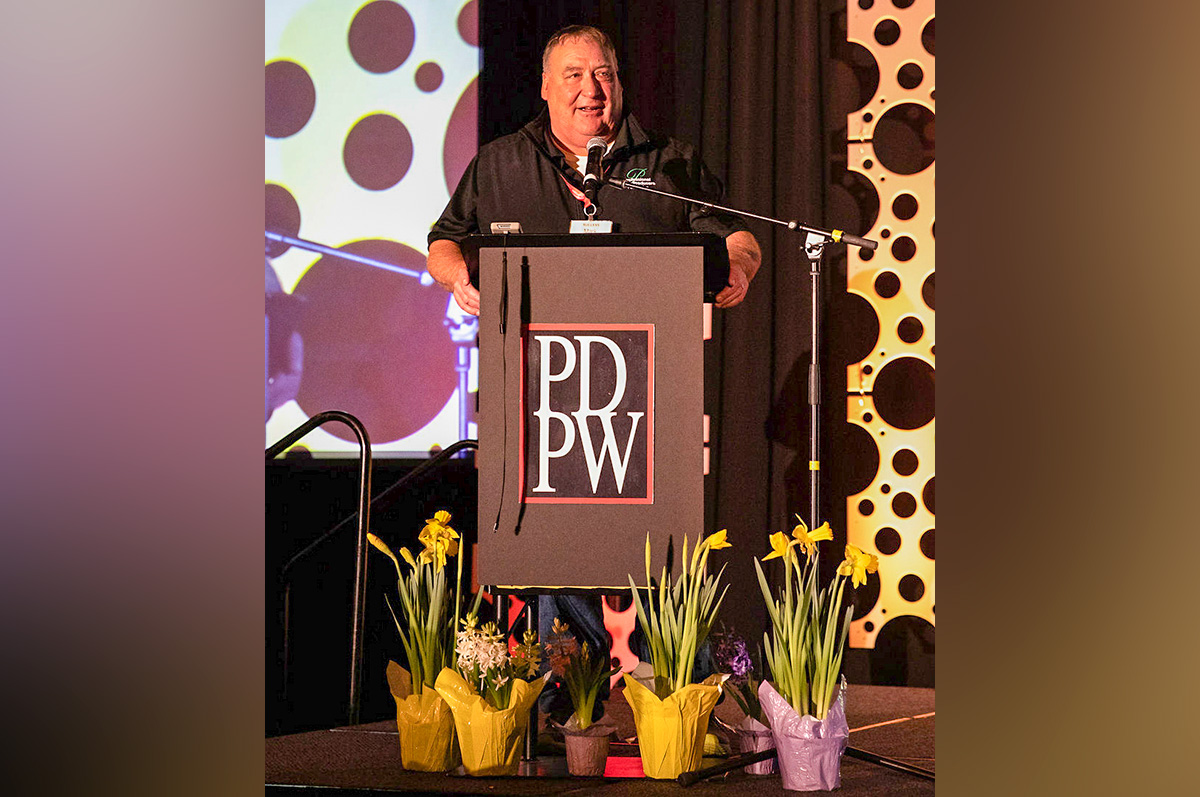
Former PDPW president and retired dairy farmer Mark Diederichs, Malone, Wisconsin, received the 2023 Dean Strauss Memorial Award. Photo courtesy of Professional Dairy Producers (PDPW).
Raising funds
The PDPF raised $18,970 during a silent auction held during the business conference. In addition to the silent auction, PDPF continues its “Plant a Seed, Inspire A Dream” campaign, accepting donations to support the creation of new and sustainable dairy leadership resources and educational programs.
Cornerstone Dairy Academy scholarships
Five Wisconsin students accepted into the PDPW Cornerstone Dairy Academy were awarded scholarships from the Wisconsin Rural Opportunities Foundation (WROF). Recipients include Mitchell Guyette, Chili; Alexis Kluenker, Manitowoc; Kelsey Maurer, Manitowoc; Heron Mireles, Chili; and Emily Pankratz, Rudolph.
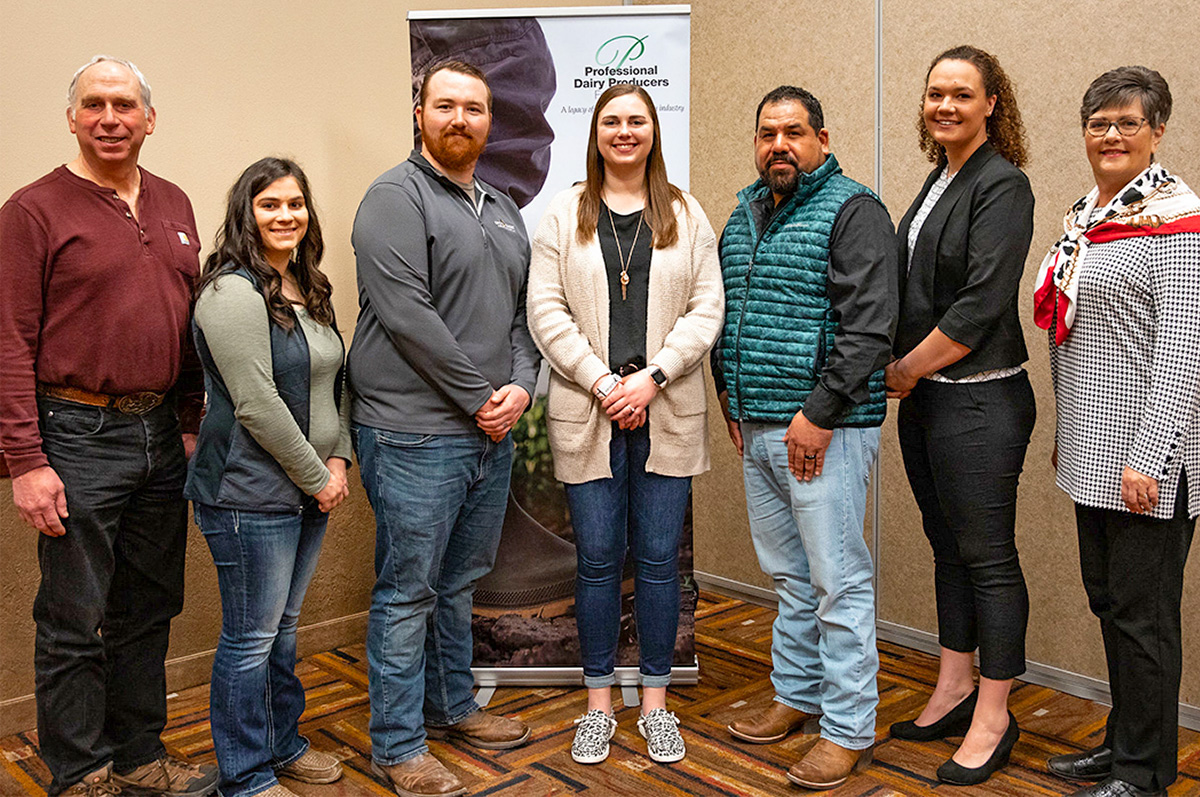
The Wisconsin Rural Opportunities Foundation (WROF) awarded five scholarships to attendees of the PDPW Cornerstone Dairy Academy. Recipients and presenters included (left to right): Jerry Gaska, WROF board member; recipients Emily Pankratz, Mitchell Guyette, Kelsey Maurer, Heron Mireles and Anna Hinchley-Skadahl; and WROF president Joan Behr. Photo courtesy of Professional Dairy Producers (PDPW).
The Wisconsin Rural Opportunities Foundation (WROF) awarded five scholarships to attendees of the PDPW Cornerstone Dairy Academy. Recipients and presenters included (left to right): Jerry Gaska, WROF board member; recipients Emily Pankratz, Mitchell Guyette, Kelsey Maurer, Heron Mireles and Anna Hinchley-Skadahl; and WROF president Joan Behr.
Cornerstone Dairy Academy graduates
Twenty-one dairy farmers and industry professionals received recognition for completing all three pillars of leadership training in PDPW’s Cornerstone Dairy Academy. Wisconsin graduates included: Sarah Benzinger, Pulaski; Hernando Duarte, Middleton; Michele Gernetzke, Evansville; Jacob Guenzler, Waunakee; Logan Gutenberger, Verona; Allison Hahn, Madison; Serenity Hetke, Ladysmith; Natalia Hincapie, Cross Plains; Valerie Kamphuis, Brandon; Jakob Kruger, Westfield; Ashley Madson, Pelican Lake; Erin Mullett, Brodhead; Gabriel Padilla Berrios, Waupaca; Emily Pankratz, Rudolph; Scott Pilgrim, Augusta; Jamie Remer, Sun Prairie; Rebecca Sanders, Owen; Lucas Schmidt, New Holstein; and Dane Trustem, Evansville.
Other graduates were Chase Mitchell, Kennett Square, Pennsylvania; and Michelle Poulin, Richmond, Vermont.
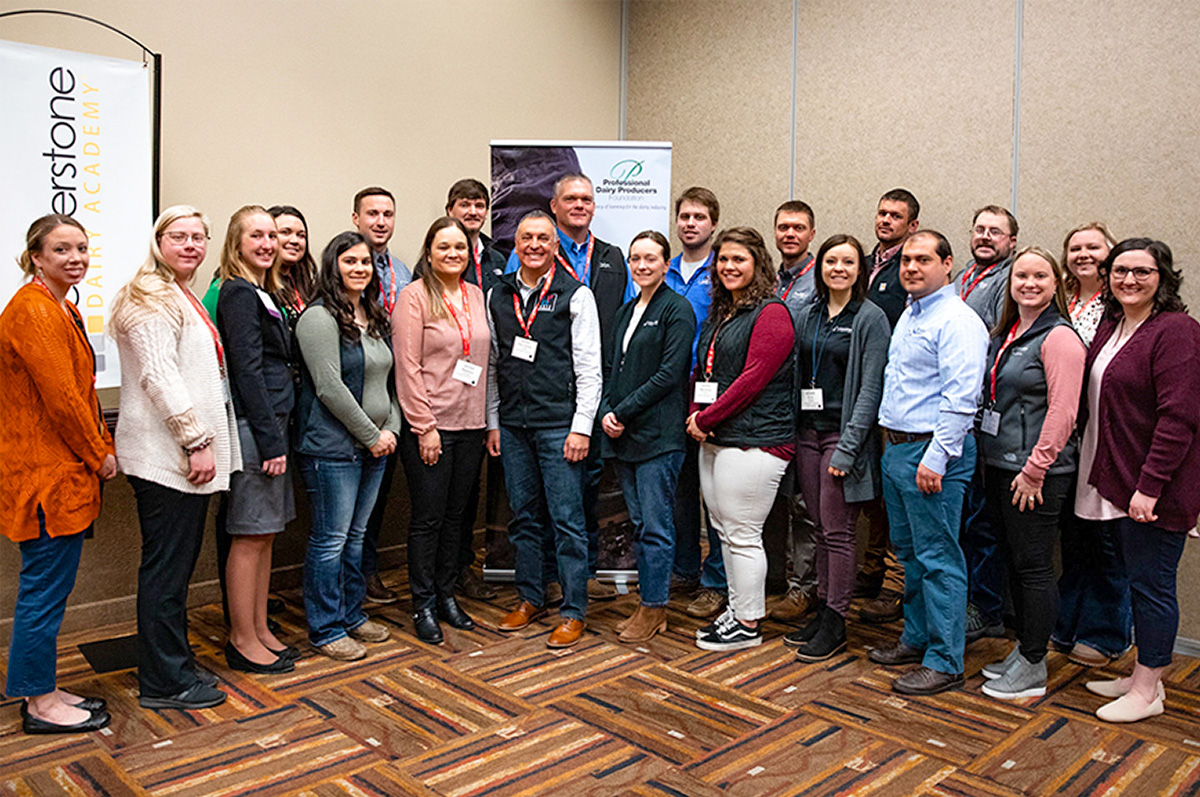
Twenty-one dairy producers and allied industry professionals graduated from PDPW Cornerstone Dairy Academy, held in conjunction with the PDPW Business Conference. Photo courtesy of Professional Dairy Producers (PDPW).
Twenty-one dairy producers and allied industry professionals graduated from PDPW Cornerstone Dairy Academy, held in conjunction with the PDPW Business Conference.
Next year
The 2024 PDPW Business Conference is set for March 13-14, 2024, in Wisconsin Dells, Wisconsin.
